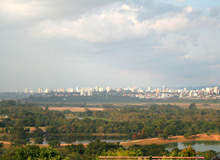
Henrique Lage Refinery is one of 95 production platforms and 15 refineries operated by Petrobras. Also known as Petrobras Revap, the refinery is located in São José dos Campos in São Paulo state, Brazil, and is the fourth-largest refinery in the country. The refinery covers an area of 10.3km² and produces 251,000bpd of gasoline, diesel fuel, jet fuel, LPG, asphalt and sulphur.
The Revap refinery was conceived in the late 1970s as part of the country’s second national development plan and was inaugurated in 1980. Initial production was based on low-viscosity crude oil but was later shifted to Brazilian offshore crude, which contains high levels of grit and coke.
In March 2009 Veolia Water Solutions and Technologies was awarded a turnkey contract for building a new wastewater treatment plant with a capacity of 300m³/h (1,320gpm) at the refinery.
In October 2009 the Revap refinery started refining its first load of oil from the Tupi presalt region. The refinery received 264,000bbl, which will be processed in two campaigns. Oil from the Tupi field is rated as paraphinic with a specific gravity of 29.2o API, equivalent to a density of 0.877. The oil has low sulphur content, which makes it perfect for meeting future specifications for all derivatives such as naphtha and diesel.
Extension
In 2007 Petrobras announced it will undertake a $900m modernisation of the Revap refinery. The plans include building a delayed coking unit with a capacity of 31,500 barrels per stream day (BPSD), a coke naphtha hydro treatment unit with a capacity of 18,900BPSD and other auxiliary units.
Modernisation of the refinery is scheduled to finish in November 2009. After completion, the Revap refinery will produce 15% of Brazil’s oil derivatives. The modernisation project is expected to generate 11,500 direct and 14,500 indirect jobs.
The modernisation is being undertaken to boost the capacity to process national oil. The new units will help convert fuel oil to lighter by-products such as diesel to meet new environmental specifications for gasoline. It will also help reduce pollution.
Japan Bank for International Cooperation (JBIC) is the main financier ($486m) for the project. A syndicate formed by Santander Banespa, Bank of Tokyo Mitsubishi, Caylon Corporate and Investment Bank, Societe Generale, BNP Paribas, Standard Chartered Bank and Sumitomo Mitsui Banking Corporation will provide $378m. Another $36m will be provided by trading companies Japonesas Mitsui and Itochu Corporation.
Contracts
Toyo Engineering was awarded a $700m contract in May 2006 for detailed engineering, procurement of equipment and materials and construction of the new facilities.
Petrobras signed a long-term supply agreement worth $16m with Metso Automation (Metso) in 2007 for the automation of the Revap refinery, undertaken as a part of its modernisation project. Metso will provide process automation systems and solutions and other related services. The existing distributed control system (DCS) will be modernised with the addition of more than 20,000 wired process input/output (I/O) interfaces.
The new wastewater treatment plant, to be built by Veolia Water Solutions & Technologies, will include a membrane bioreactor (MBR) process. It will treat high salinity wastewater (800ppm to 2,000ppm chlorides) recovered from the desalter and drainage at the bottom of the crude oil tank.
The complete system of the plant comprises different steps that include API type oil/water separation, coagulation and flocculation, dissolved air flotation (DAF), nutshell filtration for free oil polishing, equalisation and secondary treatment with membrane biological reactors (MBR).
Veolia will also provide a 700m³/h (3,083gpm) ACTIFLO clarification plant for the existing wastewater treatment plant at the refinery. The clarification plant will polish wastewater from secondary clarification before it is reused.
Technology
As part of the modernisation plans, Petrobras implemented AspenTech’s process optimisation solution for feed selection. AspenTech is a leading provider of software for optimising process manufacturing in oil and gas, petroleum, chemicals and other industries.
Real time optimisation (RTO) is an extremely sustainable technology that enhances business operations and profitability. AspenTech provided its aspenONE with the Aspen Plus Optimizer solution. The solution provides power, flexibility and enables equation-oriented (EO) optimisation for complicated RTO.
Initially Petrobras used RTO in an open-loop format in which about nine RTO runs were performed every day. These RTO runs included appropriate modifications for feed reconciliation and optimisation. The optimisation enabled operating conditions and feed and product qualities to be modelled precisely. Petrobras recognised the benefits from open loop format and decided to implement the closed loop format in the next phase of implementation.
Facilities
The refinery is equipped with direct-fired heaters, Neles Finetrol rotary control valves, Neles smart valve controllers ND 9000 and a VALVGUARD system for ESD valves. It is also equipped with Metso Field Care configuration and condition monitoring software and a maxDNA distribution control system (DCS).
The direct-fired heaters bring crude feedstock to the right temperature for distillation and consist of a series of tubes called passes. Each heater contains six to eight passes with their own double-seat globe valves.
When production at the Revap refinery was shifted from low-viscosity crude oil to offshore crude oil, a large amount of grit and coke became encrusted in the valves. As a result the valves seized up, leading to dangerous oil leakages and creating a fire hazard.
The distillation process had to be stopped every two to three months to clean the valves. It also resulted in rising labour costs and declining productivity and created problems with environmental departments.
To address this problem Petrobras contracted Metso in 2001. Metso investigated various valve options for the refinery and selected Finetrol rotary control valves, which stopped clogging and leakage. The Finetrol valves were similar to the globe valves already installed in the refinery. As a result installation of the Finetrol valves was economical and did not require changes to the pipework.
In addition to the Finetrol valves, smart valve controllers were installed. The new equipment meant Petrobras was able to undertake predictive maintenance of the refinery.



